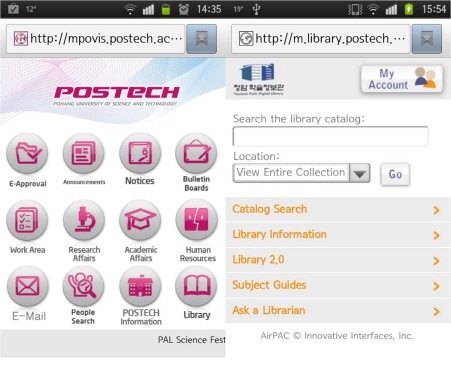More than a year ago, the campus became noisy with a feeling of expectancy when ‘POSTECH Mobile Campus Agreement’ with SK Telecom was made public. (Refer to The Postech Times No. 15 published on Oct. 22 in 2009)
The agreement included the funding for smartphones to university members, the production of a mobile groupware for users, and the installation of Wi-Fi zones across the campus. University members were sensitive to direct changes on their life (especially the grant of smartphones) as well, and that’s why one of the common business agreements of the university became so famous. It looked like a revolutionary change.
Now Take a Look at the Details
Three parts the agreement assigned last year belonged to three other departments; it’s typical in administration to divide the work of the unified project, but it sometimes confuses customers who have questions or requests on the Mobile Campus. Health, Safety and Security Management teams took upon the distribution of smartphones as Information Technology Services team and the Strategic Information Services team was in charge of constructing infrastructures and software, respectively. SK Telecom offered an on-campus smartphone agency, and collaboratively invested funding on infrastructures and software with the university.
Up to now, according to the school, more than 5,400 smartphones including Galaxy S series, Galaxy Tab, and iPhone 4 have been distributed. In the case of Wi-Fi, 1,054 APs have been installed, including 1,049 in 81 buildings and five in five outdoor sectors like 78 stairs. W-Zone service area, which can phone service to someone within the same area in 1,000 KRW for a month in the selected area, was constructed along the campus, Jigok (the Lotte Mart) and the Hyoja market. In spite of its effectiveness, still just a few members are using it.
Different from typical ideas, the Mobile Campus included the expansion of cable infrastructures. The bandwidth of data which each part of network branch can deal with was enlarged 10 times, from 1 Gbps to 10 Gbps. The amount granted for the dormitories was also increased by 1 Gbps.

The more important factor is of course software. The groupware service was already structured, and it can cover most menus available via computers. It can be downloaded on the Android market, or connected by the mobile web for the iOS users. Designed to realize almost all features of the groupware, it is prepared for everything except e-class, which a lot of students feel is of necessity. According to the Strategic Information Service team, new learning management system is in construction and planned to be completed in the next year, so that’s why e-class is not currently included in the mobile groupware. The mobile web for the library was also constructed.
The one thing especially emphasized in the current application market is its easy accessibility. Also in POSTECH, there are some developers, including PoApper (POSTECH Application Developer) started under Strategic Information Service team, and they have produced several applications like ‘POSTECH Discount’, developed by Student Union, ‘Posroid’ and ‘AndroPosB’.
It has been a year from that, however, there are not many people who feel differently from the past after the execution of the plan. Because people had high expectations, in many cases they don’t think much has changed and sometimes are curious of whether the policy is as successfully executed as it was planned in the past. One of the reasons is of course that businesses are commonly progressed and completed gradually. However, it looks to take a little portion of that and most of them are from university members’ unawareness on university businesses, including new policies.
Even though POSTECH is composed of a smaller number of members than other universities, in the school there are so many controversies and communication problems. On the one hand, it’s clearly from the top-down strategies without sufficient interactions between decision makers and members. On the other hand, as mentioned above, there are university members who have not been made aware of what the university is coming to, and most distrust and misunderstanding come from them, not from the others.
To deal with that problem, decision makers should share their processes and give members chances to discuss, and university members should reject thoughtless complaints and hostility to participate in more democratic procedures. The role of The Postech Times is surely a bridge between them, reflecting facts and opinions from different points of view. Reporting, discussing, and criticizing on the Mobile Campus is expected to be a good opportunity to think about school businesses and actively participate in being aware of them after now.


